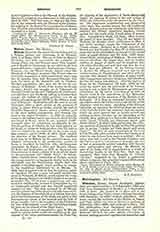

Mersenne, MARIN, French theologian, philosopher, and mathematician; b. September 8, 1588 near Oize (now Department of Sarthe); d. September 1, 1648 at Paris. He studied at Le Mans and at the Jesuit College of La Fleche, where a lifelong friendship with Descartes, his fellow student, originated. Mersenne entered the novitiate of the Minims at Nigeon near Paris (1611), was sent to Nevers as professor of philosophy (1614-1620), and returned to Paris. His first publications were theological and polemical studies against Atheism and Scepticism, but later, Mersenne devoted his time almost exclusively to science, making personal experimental researches, and publishing a number of works on mathematical sciences. His chief merit, however, is rather the encouragement which he gave to scientists of his time, the interest he took in their work, and the stimulating influence of his suggestions and questions. Gassendi and Galileo were among his friends; but, above all Mersenne is known today as Descartes’s friend and adviser. In fact, when Descartes began to lead a free and dissipated life, it was Mersenne who brought him back to more serious pursuits and directed him toward philosophy. In Paris, Mersenne was Descartes’s assiduous correspondent, auxiliary, and representative, as well as his constant defender. The numerous and vehement attacks against the “Meditations” seem, for a moment, to have aroused Malebranche’s suspicions; but Descartes’s answers to his critics gave him full satisfaction as to his friend’s orthodoxy and sincere Christian spirit. Mersenne asked that, after his death, an autopsy be made on his body, so as to serve to the last the interests of science.
Mersenne’s works are: “Quaestiones celeberrimae in Genesim” (Paris, 1623), against Atheists and Deists; a part only has been published, the rest being still in manuscript, as also a “Commentary on St. Matthew’s Gospel”; “L’impiete des deistes et des plus subtils libertins decouverte et ref utee par raisons de theologie et dc philosophic” (Paris, 1624); “La verite des sciences contre les sceptiques et les pyrrhoniens” (Paris, 1625); “Questions theologiques, physiques, morales et mathematiques” (Paris, 1634); “Questions inouies, ou recreations des savants” (Paris, 1634); “Les mecaniques de Galilee” (Paris, 1634), a translation from the Italian; “Harmonie universelle, contenant la theorie et la pratique de la musique” (Paris, 1636-7); “Nouvelles decouvertes de Galilee“, and “Nouvelles pensees de Galilee sur les mecaniques” (Paris, 1639), both translations; “Cogitata physico-mathematics” (Paris, 1644); “Euclidis elementorum libri, Apollonii Pergiei conics, Sereni de sectione coni, etc.” (Paris, 1626), selections and translations of ancient mathematicians, published again later with notes and additions under the title, “Universae geometriae mixtwque mathematicae synopsis” (Paris, 1644).
C. A. DUBRAY

